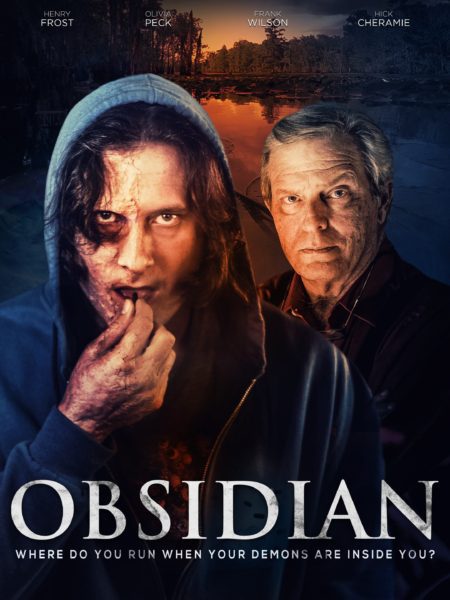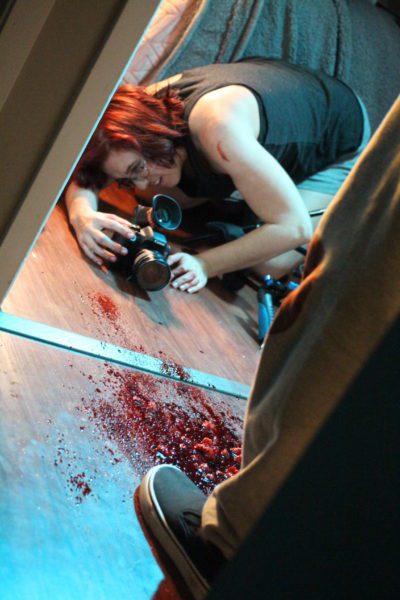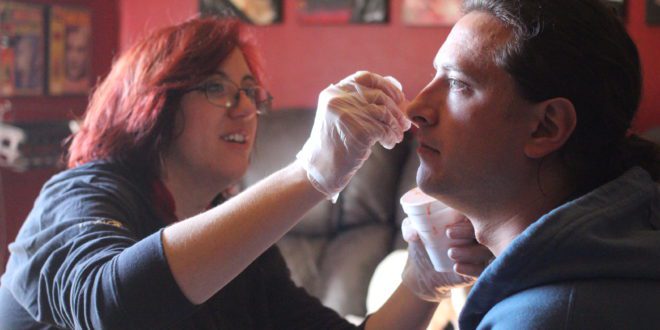Now available to stream on Amazon, YouTube, and more via Midnight Releasing, is filmmaker Erica Summer’s, Obsidian (our review). When combining a psychological thriller with elements of body horror, Summers didn’t have to look far for inspiration; personal experiences provided a deep well to draw from.
Erica was kind enough to answer some questions for us where she discussed the genre, the fight for Obsidian, and growing up with parents who encouraged a healthy love for horror.
PopHorror: I know Obsidian is an incredibly personal story for you. Can you share with our readers how this story came to be?
Erica Summers: Of course! I went back to central Florida to visit my friends and film a wedding, and I stayed for the weekend with my friend of many years, Nic Wilder. Nic was in a wheelchair after what I’m told was a pond diving accident that occurred years before I met him. Nic was a wild card. He was hilarious, salty, often grumpy, but loved his friends fiercely. There isn’t anything he wouldn’t do for us. So, when Nic offered to let me stay the weekend, I was excited to do so and spend some quality time with him. Throughout that weekend, however, I realized how hard even mundane tasks (that I always took for granted) were for someone in a wheelchair. Something as simple as showering, cooking, or making a bed were huge undertakings due to the disability. It never stopped him, though!
On my long drive back to Louisiana where I lived at the time, my heart really hurt for his situation and his pain and his struggles and I thought, “I’d give anything if there were just a pill or something that would give him the ability to walk again.” He so deserved it, because at his core, he was truly a wonderful, warm, hilarious person that left such an indelible mark on all of us. During the drive, I kept thinking about how unlucky I am and how even if there were a pill, it would probably work TOO well, and then he would end up having a whole new slew of problems and deformations. As the drive went on, I kept thinking about how that sort of a pill could actually make for a great horror movie, and by the time I arrived home 11 hours later, I had the outline all figured out in my head. I started working on the script immediately. And the story really transformed over the years into my own narrative on vanity and body image in addition to the whole idea that Nic sparked in me.

PopHorror: Obsidian can easily be embraced by those who enjoy everything from body horror to psychological thrillers. When were you introduced to horror and what has continued to make the genre appealing to you?
Erica Summers: I was introduced to horror very young by two parents who were very passionate about horror. I remember having my first nightmares around three years old regarding Freddy Kreuger turning me into a puppet like he did in Dream Warriors. My parents continually exposed me to horror, but they did it in a fun way that really got me excited about monsters and effects.
I remember once we were watching Jaws together. I was probably 5 or 6. I was terrified, and my parents paused the movie and explained to me that the Great White was just a rubber shark that was painted to look exactly like a real one and that there was a man controlling it. I didn’t believe them so my mother got out her Fangoria collection and thumbed through until she found an article and photos of the fake shark. She showed me how they made it move and said it wasn’t real. From that point forward—I call it the Jaws Effect—horror movies were rarely scary to me. I thought of them more of a magic trick. I’d watch one and think, “WOW, how did they DO that?!” instead of, “Oh my God, they just eviscerated that woman!” Now as a filmmaker, I try to find ways to make my own crafty Jaws Effect. Just as I did with the effects and creature suits in Obsidian.
PopHorror: You had a long, hard road with Obsidian. What was born of triumphs and tragedies and evolved into a legitimate passion project for yourself was, initially, overshadowed by some unscrupulous encounters with previous producers. How did you fight for Obsidian?
Erica Summers: Obsidian was a fight from very early on. I had the script finalized after some extremely high praise from some peers I sent it to for feedback (who have been reading all of my scripts) and I knew I was onto something. I knew the plot was interesting and fresh, and it seemed like everyone I talked to wanted to get involved with it. I sent it to an actor I had worked with on my last film because he was interested in auditioning and traveling from Florida for principal photography if he got the part. He loved the script so much that he wanted to be a producer on it and said he had a lot of experience finding financial backers for his day job and wanted to delve into film producing since he is a passionate actor as well. I resisted at first because I didn’t want to have to answer to anyone and ask permission for things for my indie film. I also didn’t want my project perverted by other people either. I had a clear vision of what I wanted and how to achieve it on my minuscule budget, yet he made an amazing offer and my then-husband also insisted that it would be the only way to move up in the world of filmmaking and get a chance to work with big name actors. So, I signed contracts with this person, and we felt like we were off and running for a while.
He’d ask me for my wish list of attainable actors for our budget and I’d supply them. He got the script in front of them and all of the ones who read it loved it. Several big name stars even mentioned that they’d consider doing it for a lower-than-normal rate just because they really liked the script and the fact that a female was directing it. But months went on, potential deals soured, financiers backed out, and the film fell into a bit of a development slump. So, the producer signed on a second producer—or third, I thought, but would later find out that my promise to be made a producer could be taken away because I didn’t have a contract to prove it—and the second producer made my life REALLY miserable while he was on board.
He had me do about a hundred alterations and re-writes in just a few months. He systematically tried to steamroll me into abandoning all of the things in the script that I insisted from the very start on keeping. He tried to change things that didn’t even make sense. He even pitched a Crying Game-esque twist that was ridiculous and then he began making very sexist remarks to the first producer and saying that they should fire me from my film, give me a writing credit, and direct my movie since I wouldn’t “play ball. After the first producer fired him, the movie formerly called Black Pills, fell into total limbo. The producer said that he’d lost his passion for the project, that horror wasn’t a genre he enjoyed, and he made me wait out the remainder of my 7-year contract with him before I could have the film back. After the contract was up, I revamped the script, changed the name, re-copyrighted the script again, and then immediately began production. Within a year of the contract being up, the film was shot and in the process of being edited.

PopHorror: In a previous interview, you stated, “I have never been one to insist upon females in the horror genre. I think many women don’t enjoy horror, and I want only people who are passionate about horror to create it.” While I completely agree with your sentiment of only wanting those bleeding love for horror making horror, I respectfully disagree with your assumption that many women don’t enjoy horror. I’m curious to know why you believe the majority of the female persuasion is not receptive to horror?
Erica Summers: It’s not that I think all women don’t enjoy horror. It’s that I think many don’t. I’d even go as far as to say that I don’t think the majority of women do. I only say that because of decades of my own personal experiences. I’m one of only a handful of women I’ve ever met who truly ENJOY horror. As in, not just a woman who will tolerate it because someone close to her wants to watch it, but a woman who, if given her choice of any movie to pop in the DVD player, will choose a horror movie. I also say it because as someone who has been making horror films for 16 years and going to horror conventions frequently all over the world, there have not been a lot of women in attendance. I’ve also worked on a lot of horror movies as a crew member, and it’s been a similar ratio of female to male directors and crew on horror movies as well. I see men frequently and unabashedly gushing over gruesome effects or twisted plots. In my whole life, the number of women I can say the same thing about, I can count on one hand.
When my films have played at festivals, I’ve only seen women walk out. Men typically stay through the end. When I’m selling copies of my films, the most common thing I hear from women is, “I’d love to support you by making a donation instead but I don’t want a copy. I don’t like scary movies. They give me nightmares.” And I’m truly not trying to sound sexist, but I’ve never had a man say that to me. Maybe I’ve had a coincidentally disproportioned experience.
Again, I am not trying to overgeneralize and say that women don’t enjoy horror. Only that many women don’t. t’s like saying, “Many men don’t enjoy Hallmark Christmas movies.” Some certainly do and some might love them if they gave them a chance, but in the grand scheme of things, many don’t. And that having been said, I hope in the years to come, we see something more balanced. I hope that I begin to see more women filling seats at horror screenings or the presence of more females at horror conventions. Because I think horror is the most amazing genre out there, and I hope more people of every gender fall in love with it!
PopHorror: What do you hope audiences walk away with after experiencing Obsidian?
Erica Summers: Ideally, strangely enough, my whole message with this movie is for people suffering from body dysmorphia and issues of vanity and it would be to love yourself for who you are. It would be to say stop trying to quest for physical perfection because it’s really what’s on the inside that is important, and most people aren’t as bad off as they think they are or as bad off as their mind sees them in the mirror. I’ve seen GORGEOUS people so crushed and hopeless and depressed because they aren’t as gorgeous as they THINK they should be. It’s really frustrating sometimes to love or care about someone who only seems to hate how they look because it’s all objective. And it all changes. And most people, while unhappy with themselves now, don’t realize that the reality of the situation is that NOW may be the best they will ever look again. In Obsidian, tragic events befall characters who all are questing to look more physically perfect. Some, like Jack, could benefit, although I would argue that he’s still very handsome and truly charming despite his burns, and some, like Iris, who do it for a more emotional reason, and some, like Chase, who is just there to see if it works on his appendix scar.

PopHorror: If you could program a double feature at your local drive-in, what two films make your bill and why?
Erica Summers: Wow, that’s a fun but tough question. I would love to program a double creature feature movie with Rawhead Rex followed by Pumpkinhead. Pumpkinhead is my favorite film of all time, and I think it’s still so underrated. I’m amazed by how many people still haven’t seen it.
We would like to thank Erica for her time and hope you check out Obsidian now streaming on Amazon HERE.
 PopHorror Let's Get Scared
PopHorror Let's Get Scared




